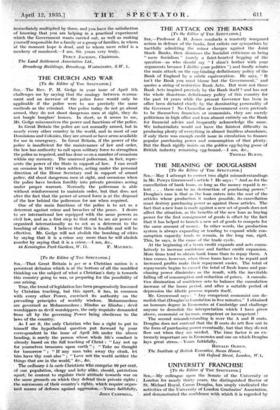THE MEANING OF DOUGLASISM
[To the Editor of THE SPECTATOR.] Sin,--May I attempt to correct two slight misunderstandings in Mr. Powys Greenwood's article ? He says : " And as for the cancellation of bank loans, so long as the money repaid is re- lent . . . there can be no destruction of purchasing power." Douglas's case is that as the loan enters into the cost of the articles whose production it makes possible, its cancellation must destroy purchasing power as against those articles. The fact that a new loan is made against a new set of goods does not affect the situation, as the benefits of the new loan as buying power for the first consignment of goods is offset by the fact that it has hefped to launch a new set of goods to compete for the same amount of money. In other words, the production system is always expanding or tending to expand while con- sumption capacity tends to remain, in the - long run, rigid. This, he says, is the cause of the trade cycle.
At the beginning of a boom credit expands and acts cumu- latively to increase confidence and further credit expansion. More firms tend to obtain bank loans than to repay them. A time comes, however, when those loans have to be repaid and increased• profits make their repayment easier. The total of repayments begins to exceed the. total of fresh loans and pur- chasing power diminishes as the result, with the inevitable falling off of consumption and reduction of prices. A cumula- tive- diminution of confidence sets to balance the cumulation increase of the boom period, and after a suitable period of depression the idiotic process repeats itself.
Mr. Greenwood says : Any competent economist can de- molish that (Douglas's) foundation in five minutes." I obtained an honours degree in Economics at Cambridge and challenge anyone to demolish the interpretation which I have given above, economist or layman, competent or incompetent !
- The second misunderstanding is over the A and B costs. Douglas does not contend that the B costs do lin flow out in the form of purchasing power eventually, but that they do not flow out when they are needed. The time factor is an ex- tremely important one in Economies and one on which Douglas lays great stress.—Yours faithfully,
RONALD OGDEN.
The Institute of British Executive, Swan House, 133 Oxford Street, London, W.1.


















































 Previous page
Previous page